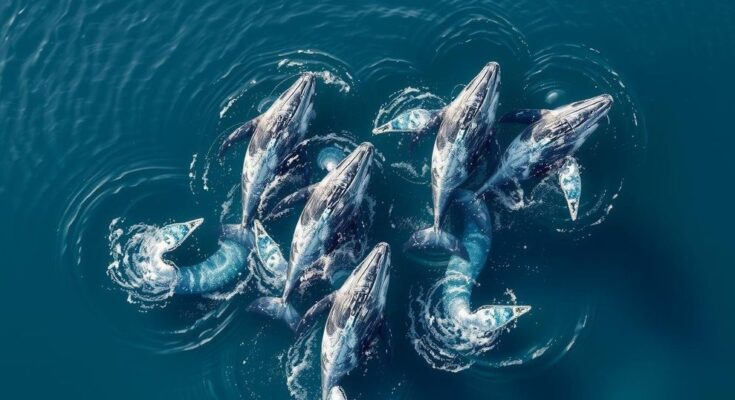A humpback whale has accomplished a record migration from Colombia to Tanzania, covering at least 13,000 kilometers. Previous sightings in Colombia occurred in 2013 and 2017, while it was seen in 2022 near Zanzibar. Scientists suggest the migration may be influenced by climate change impacting food availability or the whale’s search for new breeding grounds. The findings demonstrate the importance of citizen science in tracking marine species.
In a remarkable demonstration of the capabilities of nature, a humpback whale has completed an extraordinary migration, traveling from the Pacific coast of Colombia to Zanzibar, Tanzania. This odyssey, estimated at a minimum distance of 13,000 kilometers, provides key insights into the potential impacts of climate change on marine life. The whale, previously identified in 2013 and 2017 in Colombia, was recognized again in 2022 off the coast of Zanzibar, marking one of the most extensive migrations recorded for the species.
Scientists hypothesize that the whale’s journey may stem from altered food availability due to climate change or pursuits for new breeding prospects as global conservation efforts foster population recovery. The identification of the whale was made through the distinct pattern on its tail, analyzed alongside numerous submissions to the citizen science platform, Happywhale.com. This platform utilizes artificial intelligence to catalog and track individual humpbacks based on their unique flukes, further demonstrating the effectiveness of citizen science in conducting marine research.
The Pacific humpback whale typically covers long distances annually, migrating between warm breeding grounds and rich feeding areas. However, this particular male’s journey not only explored separate breeding locations but also potentially suggested a response to changes within its environment, igniting discussions on the factors driving such migrations.
Published in the journal Royal Society Open Science, the study illuminates the need for continued research into the behaviors of migratory species amid profound ecological shifts. According to Dr. Kalashnikova, who contributed to the study, “While actual reasons are unknown, amongst the drivers there might be global changes in the climate, extreme environmental events (that are more frequent nowadays), and evolutionary mechanisms of the species.”
In conclusion, the remarkable migration of this humpback whale symbolizes both the beauty and challenges of marine life in the face of climate change. As scientists document these unprecedented movements, they emphasize the importance of understanding and addressing the environmental factors influencing the behaviors of such majestic creatures in our oceans.
Humpback whales are renowned for their extensive migratory patterns, with annual journeys covering vast distances between breeding and feeding grounds across the world’s oceans. Recently, growing concerns regarding climate change have prompted inquiries into the adaptability of these migratory routines. Changes in food availability, specifically the small shrimp-like krill that humpbacks primarily consume, may significantly influence their migratory paths. Additionally, ongoing global conservation initiatives may lead to shifts in populations, necessitating exploration of new breeding locations. The integration of citizen science platforms, such as Happywhale.com, has provided crucial data on whale movements, facilitating the analysis of long-distance migrations. Understanding the dynamics of these migrations is essential for conservation efforts and enhancing knowledge about the interplay between climate change and marine ecosystems.
The journey undertaken by the humpback whale, spanning over 13,000 kilometers, underscores the impact of climate change on marine species and their migratory behaviors. As this species continues to adapt and navigate the challenges posed by shifting ecological conditions, the development of citizen science platforms is proving invaluable in documenting these remarkable movements. The findings not only reveal the distances these majestic creatures can traverse but also highlight the urgency of addressing environmental changes that may affect their survival and reproductive success. Continued study in this area will contribute significantly to our broader understanding of marine biodiversity in a changing world.
Original Source: www.thecitizen.co.tz




